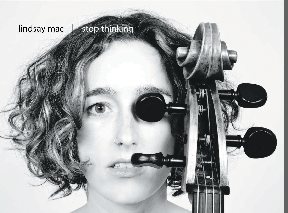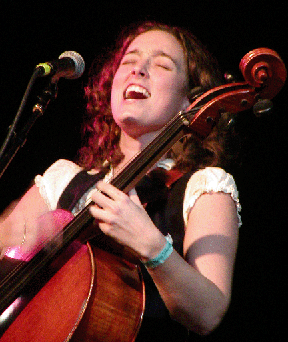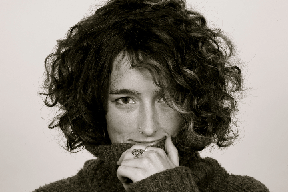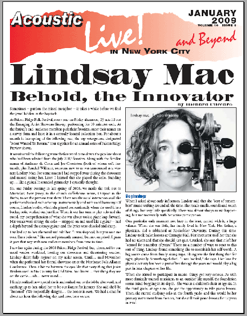Lindsay Mac
Behold, the Innovator
by Richard Cuccaro

Sometimes -- pardon the mixed metaphor -- it takes a while before we find the jewel
hidden in the haystack.
At Falcon Ridge Folk Festival, every year on Friday afternoon, 25 acts fill out the
Emerging Artist Showcase line-up, performing for 10 minutes each. At the festival's end,
audience members pick their favorites, enter their names on a survey form and leave
it in a centrally located collection box. For about a month in late spring of the following
year, the top vote-getters, designated "Most Wanted To Return," tour together for an
annual series of Falcon Ridge Preview shows.
It wasn't until the following winter before word came down the pipeline about who had
been selected from the July 2007 favorites. Along with the familiar names of Anthony da Costa
and Joe Crookston (both of whom we'd featured), plus Randall Williams, someone new
to us was announced as a winner: Lindsay Mac. For some reason I had stepped away during
the showcases and missed seeing her. Later, I learned that she played the cello.
Standing up… like a guitar. It sounded gimmicky, I cynically thought.
So, one Friday evening in late spring of 2008, we made the trek out to Montclair, New Jersey,
to the church coffeehouse venue, Outpost in the Burbs, to see the preview tour show.
There was the usual interaction as all the performers backed each other up instrumentally
and with vocal harmony. Of course, Lindsay's cello, which she played conventionally when
she used it in a backup role, worked out just fine. When it was her turn to play solo and she
stood, my comprehension of what she was about took a giant leap forward. Her vocals were
strong, the cello -- strapped on and used like a guitar -- had a depth beyond the average guitar,
and the lyrics were chiseled and sharp.
I walked up to her afterward and told her: "I was skeptical, but you won me over. I'm a believer."
She seemed pleasantly amused, but not surprised. I guess it goes that way with new audience
members from time to time.
I saw her again during the 2008 Falcon Ridge Festival, but, distracted by our usual vendor workload,
hosting our showcases and threatening weather, Lindsay didn't fully register on my radar screen.
Until… mid-November, when she performed her formal showcase set at the Northeast Folk Alliance
Conference. Then it hit me between the eyes like that nasty thing that Javier Bardem used in No Country for Old Men. You know… that thing they use on the cattle… uh… never mind…
I finally realized how special she is and rushed out to the lobby afterward, and catching up to her,
asked her to be our feature for January. She said she'd be "honored" (We respectfully disagree…
the honor is ours). We had a chat for about an hour the following day, and now, here we are.
Beginnings
When I asked about early influences, Lindsay said that she "sort of remembers" music wafting
around all the time. She recalls smells, sounds and touch of things, but very little specifically.
There was almost always music happening, but not necessarily with her active participation.
One particular early memory, not hazy in the least, carried with it, a huge valence. When she was
little, her family lived in New York. Her father, a physician, did a sabbatical at Rockefeller University.
During this time, Lindsay took ballet lessons at Carnegie Hall. Her instructor told her that she had
no talent and that she should just quit. Crushed, she says that it left her "scarred for a number of
years." There are a number of ways to react to this sort of thing. Lindsay found something else to
reestablish her self-worth. A big source came from family skiing trips. Skiing was the first thing that
felt right, physically. Something clicked. "I was hooked," she says. Her love for physical activity has
been a part of her through the years and would play a big part in later chapters of her life.
When she started to participate in music, things got very serious. As with most classically trained
musicians, to an outsider like myself, the foundation seems mind-boggling in its depth. She was
in a children's choir at age six. In the third grade, at age nine, she got the opportunity to take piano
lessons. Then, she started studying cello in the fourth grade, and this would be her primary instrument from then on, but she still took piano lessons for 12 years in total.
Interlochen
During junior high and high school there was always music during the summer. She spent three
summers at Interlochen Center for the Arts in Michigan, which has a deep history of training
consummate professionals. This was an eight-week program. Students wore uniforms and a major and minor was required She majored in cello and minored in choral. There were orchestra tours of Europe, mostly England and the British Isles. "It was a lot of work but fun," she says.
Yo Yo Ma, who she met a couple of times, was a big influence. He played with one of the first rehearsals of the orchestra at Interlochen. During the pizza party that followed, she found that he was "down to earth" and a "real person." His ability to break genre lines and take the cello to places she hadn't seen before would be foundational for what she does now.
Piano was phased out as cello emerged as her instrument of choice. Cello was a more social instrument. There were orchestras and quartets where she could interact with other players.
There were some elements of regular teenage angst, though. During adolescence, "the tumultuous years," she listened to radio a lot and began playing songs that weren't classical, material by Tori Amos and Billy Joel.
Dartmouth and the Big Switch
After high school, Lindsay went to Dartmouth. Since skiing was one of her major passions, she chose Dartmouth to be on their ski team. Initially, she entered on a pre-med track. Given that her father is a doctor she always enjoyed a scientific way of thinking. She thought that medicine would be a good way to make a positive difference in the world. She liked the idea that she'd "get to work with your brain… It seemed like a path." However, she was just average in science and she knew "you needed to be better than average."
It was in her junior year that she switched to music. She reckoned that, "If I failed at music, I could go back to medicine in some way. If I failed at medicine, I wouldn't be able to make a living at music at 35-40 years old. I'd be just starting out." Time was of the essence, so the switch was made.
London
Dartmouth had a relationship with the Royal College of London and Lindsay spent a semester there.
During that time, for one course, she went to a musical performance virtually every night. There were operas, orchestras, avant garde and classical music. She experienced the music of the Academy of St. Martin in the Fields, the London Symphony, chamber music and sometimes jazz. She was like a kid in a candy store. Eventually, though, it got really tiresome and she was finding it hard to listen. Out of it, however, came moments of great insight. It was good to be saturated so that when something stood out, it made an impact. It turned out that, while all the players were top notch, she was tired of hearing regurgitation of standard pieces, tired of accuracy and excellence but with a lack of heart, genuineness and inspiration. The people who did stand out were people who were doing their own thing. This formed another building block inside for her eventual chrysalis.
The Ride of Her Life
This is where her life starts to resemble five miles of twisting water slide at an amusement park.
While still in London, she decided that the Dartmouth curriculum wasn't going to offer enough
experience in music or "richness" in experience, so she applied to the San Francisco Conservatory
of Music and was accepted.
She spent another semester at Dartmouth, then, using a "transfer semester," studied in San Francisco. She recalls thinking "If I was really going to go for this music thing, I needed to go play with the 'big boys,' to see if I had the ability and desire to really do it."
After her semester at San Francisco, she followed with an "off term" as a ski patroller in Utah, This involved dynamiting snow masses in trouble areas to avoid surprise avalanches, deadly to skiers. She then spent another semester at Dartmouth and followed that with a summer in San Francisco as a bike messenger. She says that she needed a "brain break," really enjoying the physical labor. Picture the hills of San Francisco and see if you can appreciate the kind of "physical labor" she's talking about. This woman is an athlete at her core. Stating that she "needs the physicality in her life," the thing she misses while touring is the chance to follow athletic pursuits.
The following year was her senior year at Dartmouth and she graduated with an A.B. (Dartmouth's term) or Bachelor of Arts degree with a "focus" on music. While she was at Dartmouth, the Cry, Cry, Cry tour came through. She hadn't heard of Richard Shindell, Lucy Kaplansky or Dar Williams at that point. It was the same auditorium that the orchestra concerts were held. "The place was the same but the music was different," she states. She found that the music was really affecting her.
"It was really getting inside of me and it turned out to be a jumping-off point." She began listening to popular music -- folk, pop and blues and thought that if she could affect people in lyric and song the way she'd been affected, that would be a really cool life.
Also, while she was still in college, she saw a flyer on which a rock (but rootsy, folky) band was looking for a cellist. A friend pushed her to respond. This would be her first connection with the music world outside of the classical music environment.
The Cabin in the Woods
After graduation, Lindsay moved to a cabin in New Hampshire for about a year and a half. This functioned as a decompression/gestation period. She felt at ease, and not at all "directionless." There was hiking, skiing, making dinner and spending time with friends. Odd jobs paid the rent, like working as a bartender and giving cello lessons on the side. During this time she was able to "fool around on the cello," and says, "I got all this time to be a singer/songwriter when nobody was watching." She tried to bow and sing but it felt difficult -- "only playing one note a time -- there's no chord structure happening. No rhythm." So she started plucking. During this period, she continued to play with the roots/rock band she'd connected with in college -- they were encouraging her to do something random -- to stretch out. This led to the first effort to sing and play in front of anyone else.
In private, she worked out a song a friend had taught her at Interlochen. She loved doing it but thought that others might think it was crazy. Then she played it for the band in standard position, plucking and singing. The band was ecstatic and they recorded the song. Although it had no place on the album they were recording, Lindsay came out of her "rock interlude" with a recording of the song for herself.
Berklee Beckons
While she had made strides in breaking free of classical constraints, there was a lot more to be done. She stated: "When I was doing the stuff in New Hampshire -- and I had written a few songs now, at this point, plucking -- I realized that one of the major things holding me back wasn't the lyrics. It was the chords. It was the harmony. I knew nothing about chords and harmony. I just played what was on the page, before. Maybe if I learned something about jazz, or how to write chords and songs, it would get me where I needed to go. Berklee seemed like the perfect place and it wasn't that far away. So I applied, got in and went down there. I studied jazz, songwriting, cello performance in general, ear training and harmony, all that stuff. People were always talking about 'one-four-five' [chord progression] -- I had no idea what they were talking about.
I'd done classical harmony, but that was about looking at the page -- it was like math -- it wasn't about what I heard. That's what I needed. I needed to know what I was talking about." She attended Berklee for three semesters in total, working in between to pay for tuition.

Standing Up for K.D. Lang
The switch to standing with the cello had its genesis with a 5-song demo CD she'd made when she was with the band in New Hampshire. She'd given it to one of the production professors at Berklee, then figured they were too busy to do anything with it.
But, impressed, they had passed it along and it fell into the hands of K.D. Lang's manager, who needed someone to open for K.D. at a show in Boston.
Seemingly out of the blue, she got a call from the manager, asking her to open for K.D. …in a week or so! She was smart enough to say, "Sure, no problem!" but got off the phone terrified, feeling unprepared for the gig. She didn't have a band or a "product" to sell. Nevertheless, this was not a gig to be passed up. This was when she decided that sitting down in front of a huge audience wouldn't do. She needed to improvise a strap arrangement and practice playing standing up. She did just that and also called around and found some people to accompany her. Standing up with the strap was a mixed proposition at first. It felt somewhat awkward and changed her position a lot. It was going to require some "re-learning." However, she says that "the sheer physical sensation of standing up with my instrument in front of me felt so natural. Even though it was a cello, the physical
nature of the position felt right." I was connected to the floor and my body and I could give some energy to the audience. Sitting down, the energy stagnates and doesn't go out. It felt great, but it felt scary." She had to overcome the fear that comes with taking a risk, of doing something completely new. Part of the fear was, "People are going to think I'm a freak."
The Singer Re-enters
Another new development during this period was the coordination between playing and singing. As a cellist, part of an orchestra or ensemble, her job was to play, not sing. While there had been the choral experience in early childhood and at Interlochen during high school, singing was pushed far into the background. "I always felt, naturally, that I wanted to sing, but having grown up in the classical world I was really aware of the idea that 'you can't do anything unless you're trained to do it.' So, I suppressed the desire. There was this really cool thing, when I started to sing and I hadn't had any lessons -- I could go up or down -- finally it fell into this groove of what felt real and right and natural.
Cello training, in a way, transcends cello and goes into the voice. In the sense of like, how do you get a good tone? Not by pushing harder, but by getting better contact; by putting the weight of your arm into the bow, into the string, and then it comes naturally. So much of how I think about singing is, from the torso, from your solar plexus. For me, it's like, make a sound in your belly and try to not interfere with it on its way out. That's how I'm thinking about it. It's possible that maybe I was trained, just not directly."
On the Road
After the K.D. Lang gig, Lindsay started to book some gigs in Boston. She wanted to use the recent experience to best of her advantage. so she played pubs and places that other people at Berklee had told her about. In addition, she needed a product, a CD. It would be her calling card. She worked with two professors, an engineer and producer, at Berklee. The first CD, Small Revolution came out in late 2005.
The next step would be to go out and tour, to get people to hear it and buy it. She "passed" on the usual formula of most beginners, of playing the local scene and then moving outward. Because of her geographical history of living in lots of different places, and because she didn't know anyone in the northeast except for the areas around Dartmouth and Berklee, she decided to go with a national tour from the get-go, to "find the pockets of places where my music would resonate."
Dev Ray, her manager, was part of the recording and believed in the product and what she was doing. He'd said, "if you need any help, let me know." So they hit the road together, living in the car. They toured around the country for a year-and-a-half.
In 2007, she was named a Kerrville New Folk finalist and won the Falcon Ridge "Most Wanted" slot. This was in addition to playing the New Year's Eve Concert for Peace at the Cathedral of St. John The Divine, NYC, which featured Judy Collins. She also played Club Passim's Cutting Edge of the Campfire Festival. Other honors included being chosen as:
• a North by Northeast Artist
• a FolkWest's IndieFest Artist, and
• a Starbucks Music Makers Competition Finalist.
In 2008, she released her second CD, Stop Thinking. This CD has been chosen to be played on all American Airlines flights this year and has been named #2 in Music Connection's TOP 25 New Music Critiques Of 2008.

The Songs
Looking at her first CD, it's tempting to see the first track "Small Revolution (Peter Pan)," a stirring anthem, as a metaphoric rebuke to that heartless diva who crushed her spirit in dance class. We rejoice as she sings,
"We're flying… We're flying to the beat of our own wings, We're flying… Never-Never Land's beneath our skin…"
The song, "Pale Reflection" about the emptiness left by the death of a spouse, has the power to conjure up all the old ghosts of any listener's personal losses. As she sings about the protagonist's sad dance around the kitchen, all your old ghosts will come dancing out as well. You'll see.
In Lindsay's phrasing on the first CD, we can hear echoes of Ani DiFranco, an inspiration for many a burgeoning female singer/songwriter, but in the new CD, we hear a woman who's come completely into her own.
In "Barbies & Broncos," we're treated to a breathless race into ecstasy, as she sings "
…there's always someone there to tell you who you are and who to become
but there's nothing better than knowing where you stand with you yourself the only one
here I am, between the Barbies and the Broncos…"
We revel in her joy at her self-knowledge.
"Seven Stones" is the song that made me see the power in Lindsay's writing. It's a metaphor for her own life and the world, a hope to preserve what's decent about humanity. She sings about a girl who tries to protect a lighthouse from storms with just seven stones, She wants to protect something sacred to her. It's crazy, but she's going to take what she has and use it. the audacity of the notion is that -- sometimes hope is the strongest, most amazing thing.
"I could be the one that you call home, I could be your seven little stones…"
Lindsay says, "I know that strapping on a cello and singing isn't going to change the world, but there's not much choice but to push ahead and do what you feel is real and true."
What more can we ask?
Local concertgoers can hear her sing what's real and true on January 9 at The Outpost in the Burbs in Montclair, NJ. (see our listings) when she opens for The Kennedys. After that, she's off to Massachusetts, then points West and North (February in Fargo ND! Yikes!) On March 21, she's back in Westchester for a "New Voices" concert.
For more details and information check her web site at:

